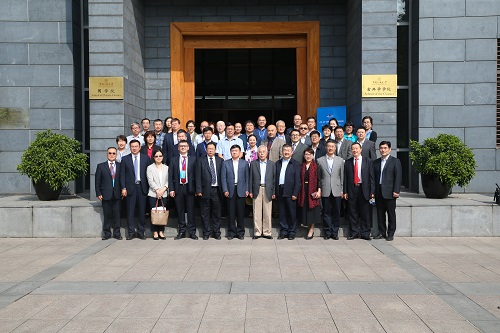 Research Update
Research Update
08
October
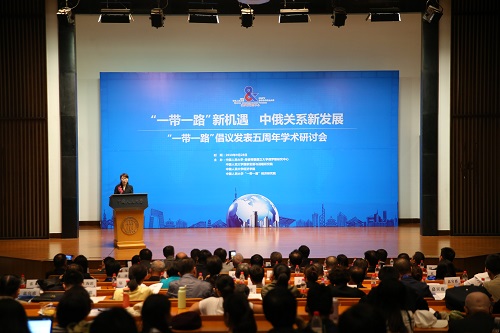
Li Fenglin, former Chinese ambassador to Russia and honorary chairman of the Center for Russian Studies, He Yaomin, vice president of Renmin University of China, Chang Xuhong, Counsellor of Europe-Asia Department of the Ministry of Foreign Affairs, Igor Pozniakov, Secretary of the Russian Embassy in China and representative of the Ministry of Education and Scientific Research in China, Yang Xiaochun, deputy director of the Chinese and Foreign Humanities Exchange Center of the Ministry of Education, Liu Jianqing, Director of Europe-Asia Division of the International Department of the Ministry of Education, Liu Mingyu, Chairman of Shenzhen Benkai Safety Technology Co., Ltd., and Trustee of Center for Russian Studies.
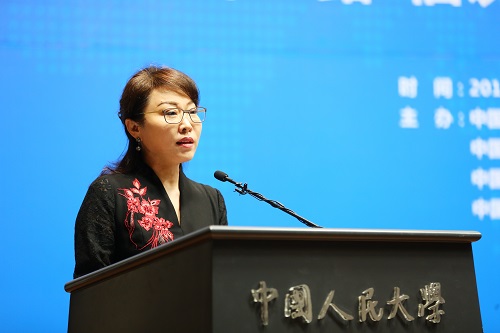
Professor Guan Xueling, Secretary of the Party Committee and Standing Deputy Dean of the School of Economics of Renmin University of China, first reviewed and summarized the work of the Center for three years. She said that in 2015, the Center was unveiled under the witness of then Vice Premier Liu Yandong and Russian Vice Prime Minister Gorozet. In the past three years, the Center has been working hard, making progress, focusing on the advantages of disciplines, consolidating basic theoretical research, relying on academic resources, highlighting Sino-Russian joint research, working hard to innovate and cooperate, and building an educational cooperation platform. On the basis of the cooperation and exchanges between Chinese and Russian universities, the Center for Russian Stuides is deeply rooted in the fertile soil of Sino-Russian higher education exchanges, and actively cooperates with the national “Belt and Road” initiative to serve government decision-making and corporate investment, with high standards, high density and high level of academics exchanges and cooperation, making their own contributions to promoting Russian studies and the development of Sino-Russian relations.
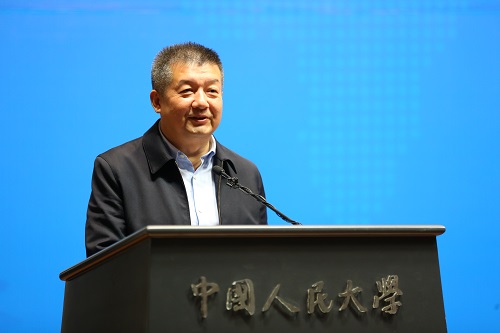
Vice President of RUC He Yaomin first extended a warm welcome to the guests on behalf of Renmin University of China. He highly affirmed the work done by the Center for three years and expressed his earnest expectations for its future work. He said that the BRI has gradually changed from the original concept to a new regional cooperation framework with extensive participation in many countries along the line. Under the background of the current anti-globalization trend and trade protectionism, Sino-Russian strategic cooperation will become the ballast stone for maintaining world peace and stability. The importance of Sino-Russian relations and Russian studies is even more prominent. On the historical node of the fifth anniversary of the “Belt and Road Initiative”, it is very valuable to review and summarize the work done by the Center in the past three years. He hopes that the center will make greater contributions in gathering talents, gathering experts' wisdom and talent training. It also hopes that the international research centers of major universities can form a joint force and develop together.
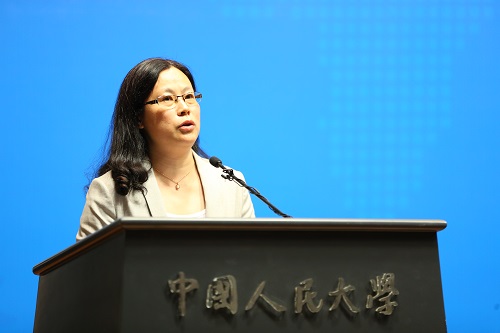
In her speech, Counsellor Chang Xuhong pointed out that Russia is China's most important comprehensive strategic cooperation partner and the most important participant in the construction of the “Belt and Road”. With building the “Belt and Road” and the Eurasian Economic Union as the main line, the two sides are strengthening policy communication and all-round cooperation. In order to promote the in-depth development of Sino-Russian cooperation, it is necessary for the Chinese and Russian academic circles to actively consult and make suggestions and provide strong intellectual support. Since its establishment in 2015, the Center for Russian Studies has carried out a large number of fruitful research work and rich academic exchange activities based on the high-quality resources of two well-known universities. It has strengthened the strategic research on Sino-Russian relations, spread the traditional culture of the two countries, and played a positive role in promoting jointly cultivating talents. It has become a highlight of exchanges and cooperation between the two sides.
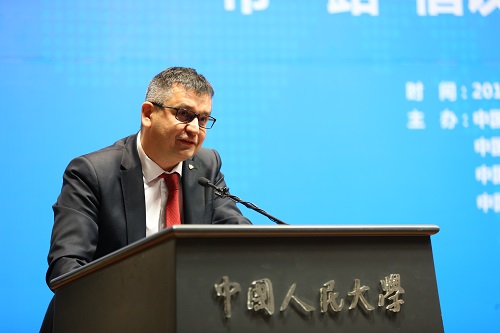
In his speech, Igor Poznyakov expressed his heartfelt gratitude to the Center for its work in promoting Russian culture and highly recognized its work. He emphasized that humanities cooperation and educational exchanges are a very important part of the strategic cooperation between China and Russia. He hopes that the exchanges between the two countries in the field of education and culture will reach a new level in the future.
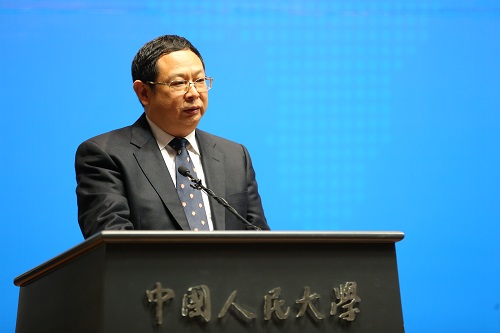
Deputy Director Yang Xiaochun said in his speech that the construction of the “Belt and Road” focuses on humanities exchanges and strengthen the people-to-people bond. In the past five years, humanities exchanges have built bridges and education cooperation has developed steadily. Sino-Russian education exchanges have continued to deepen, and humanities cooperation has entered a new stage of development. The cooperation and exchange mechanism in the humanities field has been improving day by day, and a large number of projects have taken root. As for how to promote the construction of the “Belt and Road” and strengthen the exchange of Chinese and foreign humanities, he suggested that it is necessary to establish and improve the institutional mechanisms for the participation of universities in Chinese and foreign cultural exchanges, comprehensively improve the level of informatization work, and enhance the communication power of humanities exchanges.
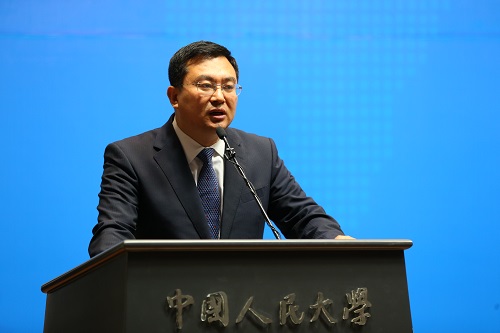
Director Liu Jianqing said that the BRI and the Eurasian Economic Union's docking cooperation have brought the high-level development of China-Russia comprehensive strategic partnership of cooperation to a new stage. The breadth and depth of cooperation between the two countries in various fields has been continuously strengthened, and highlights in humanities exchanges and cooperation are numerous. He hopes that the Center will strengthen the cooperation of high-end think tanks and produce more valuable achievements, and make greater contributions to the promotion of Sino-Russian cooperation in the humanities field and the integration of the BRI with the Eurasian Economic Union.
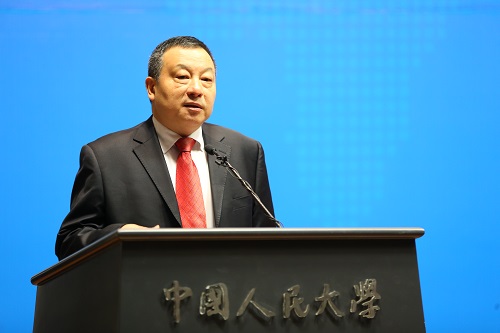
In his speech, Chairman Liu Mingyu said that China and Russia are the important countries that stabilize the world order, and it is of vital importance to do a good job in Russian studies. Since its establishment three years ago, the Center has actively coordinate with the BRI and is committed to promoting Sino-Russian humanities exchanges and educational cooperation. The achievements have been very gratifying. I hope that the Center will continue to contribute to the great cause of China-Russia peace by not forgetting its original intentions.
After the keynote speech, experts and scholars also answered questions raised by media reporters and participants.
